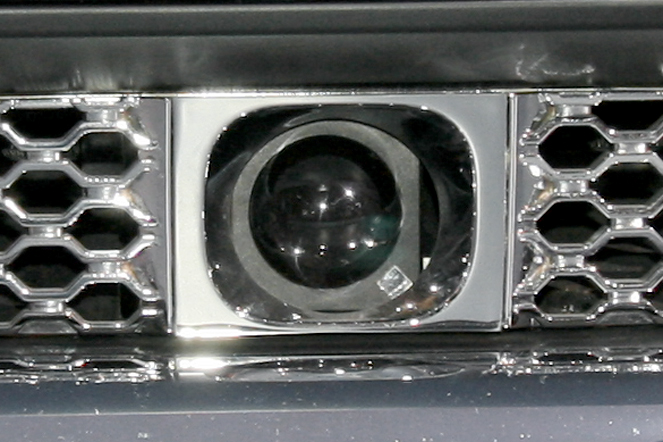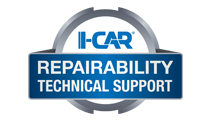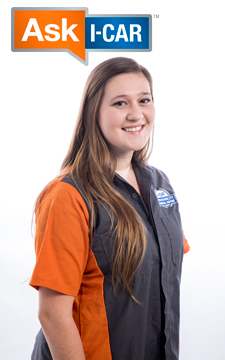When ADAS Can't See: Adaptive Cruise Control System

Collision repairs on vehicles equipped with advanced driver assistance systems (ADAS) can have more restrictions than vehicles without ADAS. Items that historically would be a simple repair may now need to be replaced. The ADAS needs to be able to see/sense in some way, whether it be by radar, camera-view, ultrasonic, etc. Repairers need to keep sensor/camera field of vision clear to avoid system malfunctions. For example, repair material that would normally be used to repair a gouge in a bumper cover is now a problem because it can block the sensor’s field of vision and may not allow the sensor to function properly.
Some OEMs have warnings against making repairs in front of sensors/cameras or a certain distance from the sensors/cameras. However, many times there is also a list of other items that can block the sensor/camera view. Let’s take a look at some common things or materials that can interfere with the adaptive cruise control (ACC) system.
Adaptive cruise control systems primarily use cameras and sensors to regulate distance to the vehicle ahead. For camera-based systems, the camera needs a clear view in front of the vehicle and of the vehicle in front of it. In most cases, any damage in front of the camera’s view is not repairable. If there is a stone chip or any other damage by the camera, the windshield may require replacement. When replacing a windshield, it is important to look for any defects in what will be the camera’s vision path.
ACC systems that use radars also require an unobstructed view in front of the vehicle. Radars mounted behind the front bumper cover or grille can be blinded by repair materials or excessive refinish materials. The signal from radar can change speeds after passing through repair material, giving false readings. For this reason, a normally repairable bumper cover may be a candidate for replacement.
The windshield and the bumper cover normally receives the worst of what mother nature can throw at it. Most forms of precipitation, such as rain, snow, and ice, can blind the camera and block the radar. Direct sunlight may also make it difficult for the camera to see. A dirty windshield or bumper cover can block the camera’s or radar’s field of view. Dead bugs, dust, and mud may need to be removed for the ACC system to work properly.
To prevent impeding the ability of the ADAS to function and potentially fail, check OEM repair information to identify what restrictions may apply to the repairs you are considering. Always verify that the ADAS is functioning properly after completing repairs.
Additional I-CAR Collision Repair News you may find helpful:
- ADAS, Calibration, And Scanning Article Hotspot
- Understanding The Adaptive Cruise Control System
- When ADAS Can't See
Related I-CAR Courses
-
Toyota/Lexus/Scion Position Statement: Pre- and Post-Repair System Scanning
Thursday, 28 July 2016
As the industry continues to ask if pre- and post-repair system scanning is necessary, Toyota/Lexus/Scion provides their answer.
-
Pre- and Post-Repair System Scanning Statements
Wednesday, 9 January 2019
Are you wondering if a particular OEM or organization has a published statement on pre-repair and post-repair scanning? We have compiled a list of most of the statements on the subject, so you can...
-
ADAS, Calibration, And Scanning Article Hotspot
Monday, 14 January 2019
Since advanced driver assistance systems (ADAS), scanning, and calibration first started becoming relevant, members of the collision repair industry have required as much knowledge as possible on...
-
Honda/Acura Position Statement: Pre- and Post-Repair System Scanning - UPDATE
Wednesday, 22 May 2019
Honda /Acura has updated their position statement on pre- and post-repair scanning to give more clarification on what is expected for scanning.
-
BMW Position Statement: Pre- and Post-Repair System Scanning - UPDATE
Friday, 10 April 2020
BMW has released a position statement related to pre- and post-repair system scanning. The statement applies to All vehicles equipped with on board diagnostics II (OBD II).
-
Quickly Identifying Outer Quarter Panels w/Rolled Hem Flanges
Monday, 5 March 2018
The I-CAR best practice article, Recycled Outer Quarter Panels w/Rolled Hem Flanges has gotten a lot of interest from the collision repair industry. It’s important to know which vehicles are...
-
General Motors Position Statement: Pre- and Post-Repair System Scanning
Friday, 21 October 2016
As the industry continues to ask, are pre- and post-repair scans necessary, General Motors provides their answer.
-
Restraints Wiring Repairs
Monday, 23 May 2016
Over the past few months, we've been sharing OEM position statements on restraints wiring repairs. Now we're bringing them all together in one place for easy reference.
-
FCA/Stellantis Position Statement: Pre- and Post-Repair System Scanning
Thursday, 9 June 2016
FCA/Stellantis has released a position statement related to pre- and post-repair system scanning.
-
Typical Calibration Requirements For Forward Radar Sensors
Wednesday, 12 October 2016
Technicians should be aware of what’s required to keep advanced driver assistance systems (ADAS) running safely after a collision. Whether that be aiming a camera, which can cause a system to not...
-
Nissan/INFINITI Position Statements: Advanced Driver Assistance System Components
Thursday, 8 January 2026
Nissan/INFINITI released position statements on the use of salvaged, aftermarket, and "secondary-market" advanced driver assistance systems (ADAS) components.
-
I-CAR Repairers Realm: RTS 2025 Year In Review - Now Available
Tuesday, 6 January 2026
I-CAR had a discussion on the Repairability Technical Support (RTS) 2025 year in review.
-
Ford On Target 2025: Volume 4
Monday, 5 January 2026
Ford has released the fourth installment of their On Target publication for 2025.
-
Structural Sectioning Procedures: Ford/Lincoln - UPDATE
Friday, 19 December 2025
Ask I-CAR receives many technical inquiries referring to sectioning. The collision repair industry wants to know where can you section, does the OEM have a sectioning procedure, and where can I find the...
-
Body Repair Manual Symbols: Hyundai
Wednesday, 17 December 2025
While looking at repair procedures in a body repair manual (BRM) you may notice that symbols are used to indicate specific operations or parts to be used during the repair process. Most BRMs provide a...
-
Body Repair Manual Symbols: Genesis
Wednesday, 17 December 2025
While looking at repair procedures in a body repair manual (BRM) you may notice that symbols are used to indicate specific operations or parts to be used during the repair process. Most BRMs provide a...
-
App-Based Connected Services Considerations: BMW
Wednesday, 10 December 2025
Have you had an experience where the vehicle notified the owner that it was being moved while it was in your repair facility? App-based connected services are available from many vehicle makers and...
-
Digital Key Considerations: BMW
Wednesday, 10 December 2025
The intermingling of technology and automobiles continues, with digital key offerings from most vehicle makers. Digital keys utilize smartphone technology to expand vehicle access and owner...
-
Mercedes-Benz Vehicles On The RTS OEM Calibration Requirements Search
Thursday, 4 December 2025
Mercedes-Benz models are now listed in the OEM Calibration Requirements Search page on the RTS website. You're going to notice a difference between other vehicle search results and Mercedes-Benz...
-
I-CAR Repairers Realm - New In 2026: Mixed Attachment Methods And Steel Sectioning Recertification - Now Available
Monday, 1 December 2025
I-CAR had a discussion on the new Mixed Attachment Methods course launching in 2026.
- 2026
- January 2026 (3)
- 2025
- December 2025 (8)
- November 2025 (11)
- October 2025 (13)
- September 2025 (11)
- August 2025 (12)
- July 2025 (11)
- June 2025 (11)
- May 2025 (11)
- April 2025 (13)
- March 2025 (12)
- February 2025 (11)
- January 2025 (12)
- 2024
- December 2024 (8)
- November 2024 (10)
- October 2024 (13)
- September 2024 (10)
- August 2024 (12)
- July 2024 (11)
- June 2024 (9)
- May 2024 (13)
- April 2024 (12)
- March 2024 (12)
- February 2024 (12)
- January 2024 (9)
- 2023
- December 2023 (8)
- November 2023 (12)
- October 2023 (11)
- September 2023 (11)
- August 2023 (12)
- July 2023 (9)
- June 2023 (11)
- May 2023 (12)
- April 2023 (11)
- March 2023 (12)
- February 2023 (10)
- January 2023 (11)
- 2022
- December 2022 (11)
- November 2022 (12)
- October 2022 (11)
- September 2022 (13)
- August 2022 (11)
- July 2022 (10)
- June 2022 (13)
- May 2022 (11)
- April 2022 (12)
- March 2022 (10)
- February 2022 (11)
- January 2022 (13)
- 2021
- December 2021 (13)
- November 2021 (11)
- October 2021 (13)
- September 2021 (14)
- August 2021 (12)
- July 2021 (15)
- June 2021 (17)
- May 2021 (11)
- April 2021 (14)
- March 2021 (20)
- February 2021 (14)
- January 2021 (14)
- 2020
- December 2020 (13)
- November 2020 (17)
- October 2020 (12)
- September 2020 (14)
- August 2020 (11)
- July 2020 (18)
- June 2020 (14)
- May 2020 (14)
- April 2020 (19)
- March 2020 (12)
- February 2020 (13)
- January 2020 (14)
- 2019
- December 2019 (13)
- November 2019 (19)
- October 2019 (25)
- September 2019 (20)
- August 2019 (22)
- July 2019 (23)
- June 2019 (20)
- May 2019 (19)
- April 2019 (20)
- March 2019 (20)
- February 2019 (18)
- January 2019 (17)
- 2018
- December 2018 (18)
- November 2018 (19)
- October 2018 (17)
- September 2018 (16)
- August 2018 (21)
- July 2018 (20)
- June 2018 (21)
- May 2018 (17)
- April 2018 (19)
- March 2018 (21)
- February 2018 (15)
- January 2018 (20)
- 2017
- December 2017 (13)
- November 2017 (15)
- October 2017 (19)
- September 2017 (20)
- August 2017 (19)
- July 2017 (18)
- June 2017 (19)
- May 2017 (18)
- April 2017 (13)
- March 2017 (18)
- February 2017 (10)
- January 2017 (11)
- 2016
- December 2016 (9)
- November 2016 (14)
- October 2016 (21)
- September 2016 (10)
- August 2016 (11)
- July 2016 (8)
- June 2016 (10)
- May 2016 (5)
- April 2016 (11)
- March 2016 (12)
- February 2016 (10)
- January 2016 (8)
- 2015
- December 2015 (9)
- November 2015 (6)
- October 2015 (8)
- September 2015 (7)
- August 2015 (11)
- July 2015 (7)
- June 2015 (5)
- May 2015 (7)
- April 2015 (8)
- March 2015 (8)
- February 2015 (9)
- January 2015 (10)
- 2014
- December 2014 (12)
- November 2014 (7)
- October 2014 (11)
- September 2014 (10)
- August 2014 (9)
- July 2014 (12)
- June 2014 (9)
- May 2014 (12)
- April 2014 (9)
- March 2014 (6)
- February 2014 (1)
- January 2014 (26)










